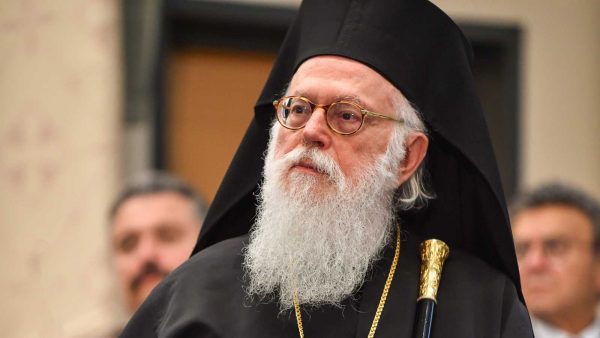In his Easter message, His Beatitude Archbishop Anastasios of Albania refers to the vaccine brought by Christ to the world to overcome hatred, namely the voluntary offering of forgiveness.
“Forgiveness, hence after, has become an essential chromosome of the life of the conscious Christian,” Archbishop Anastasios stressed.
His Beatitude pointed out that sometimes we do not use the medicine that Christ left us, because “often many of us try to avoid this basic evangelical principle and command.”
“We insist upon our rights and we call for the maintenance of our dignity and we magnify the danger posed by those who fight against us. Despite this, there is no greater freedom than forgiveness.”
The Greek Orthodox Archbishop of Albania noted that “it is not enough for us to be personally set free from the side effects of hatred.”
“It is imperative for us to contribute continually to the decrease of the tensions around us, to the de-escalation of polarization, of conflicts, and the various mutations of hatred.”
Blessed are those who achieve, through their word and life, the mitigation of discord, oppositions, and hostilities by cultivating reconciliation. Blessed are those who are inspired by the forgiveness which rose from the grave of Christ. It was Him Who first took the initiative to give His life “as a ransom for many” (Mat. 20:28). For they are indeed shown as “children of the Resurrection”.
Archbishop Anastasios highlighted that infects the life of humankind in the family, in the religious and political life, in the relations of nations, creating unpredictable conflicts.
“And today, within the murky atmosphere created by the pandemic, a peculiar hatred often appears in many environments, with various mutations, from the simplest of symptoms –indignation, antipathy, aggressiveness, to the most serious symptoms – polarization, violence, discord.”
This scourge found in all times has found healing through the act of the Resurrection of the Saviour Jesus Christ, who also left us the right medicine.
“The events of the crucifixion of Christ are not only connected with horrible pains, obvious injustices, and fathomless deceit but primarily with the abyssal hatred of the religious leadership, who stoked a burgeoning hostility within the mob. Regardless, all of this was overthrown by the Resurrection of Christ. Without deafening noise, peacefully.”
“The Resurrection proclaims a comprehensive victory over death, evil machinations, and the mortifying passions: envy, falsehoods, and especially hatred with its various mutations, resentment, revenge, deceit, which remain resilient in all epochs and in all societies.”


















